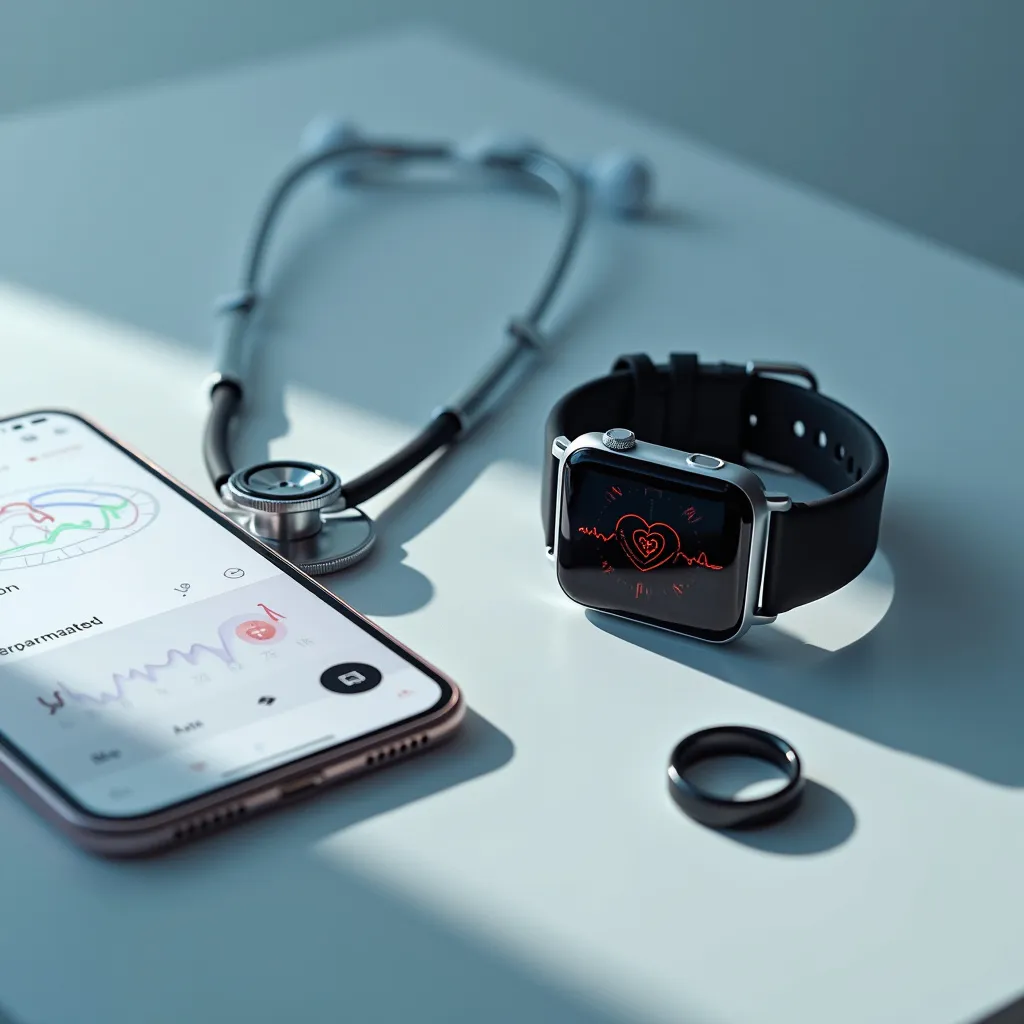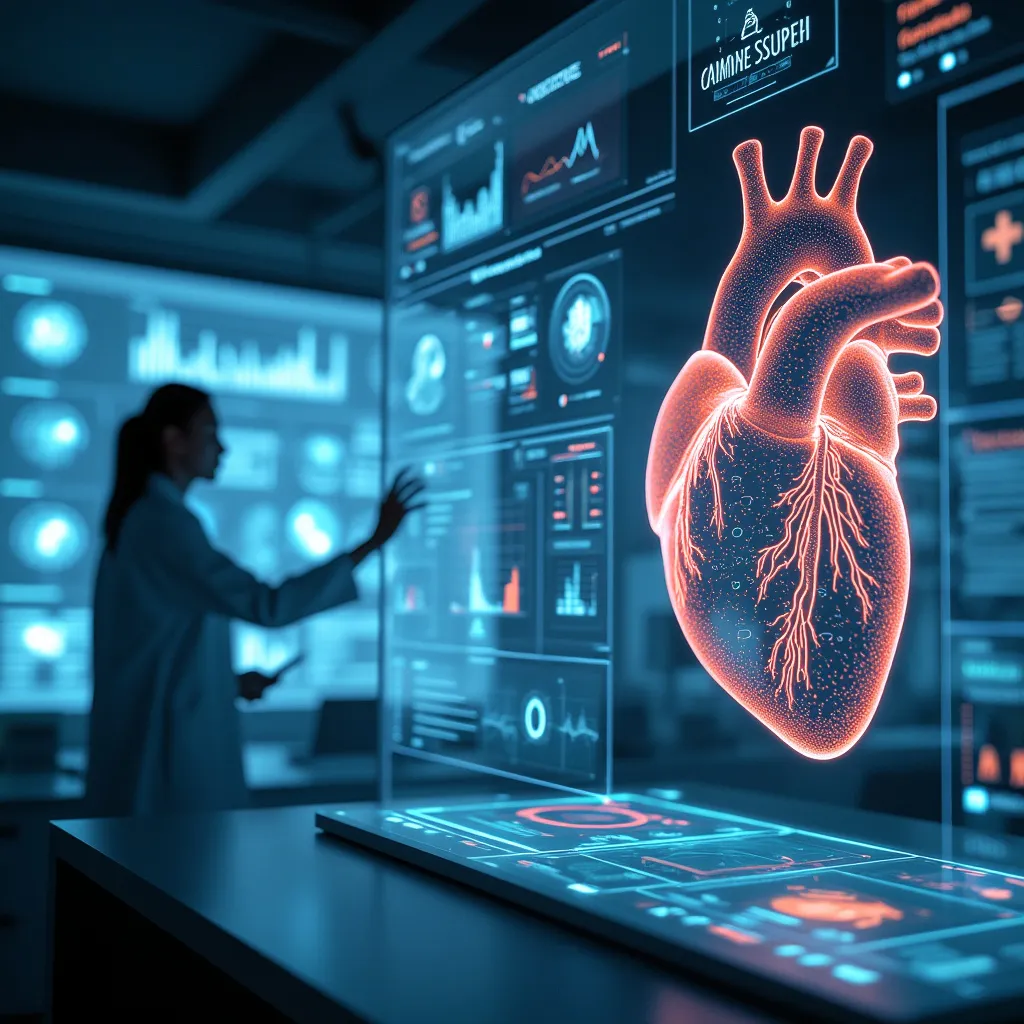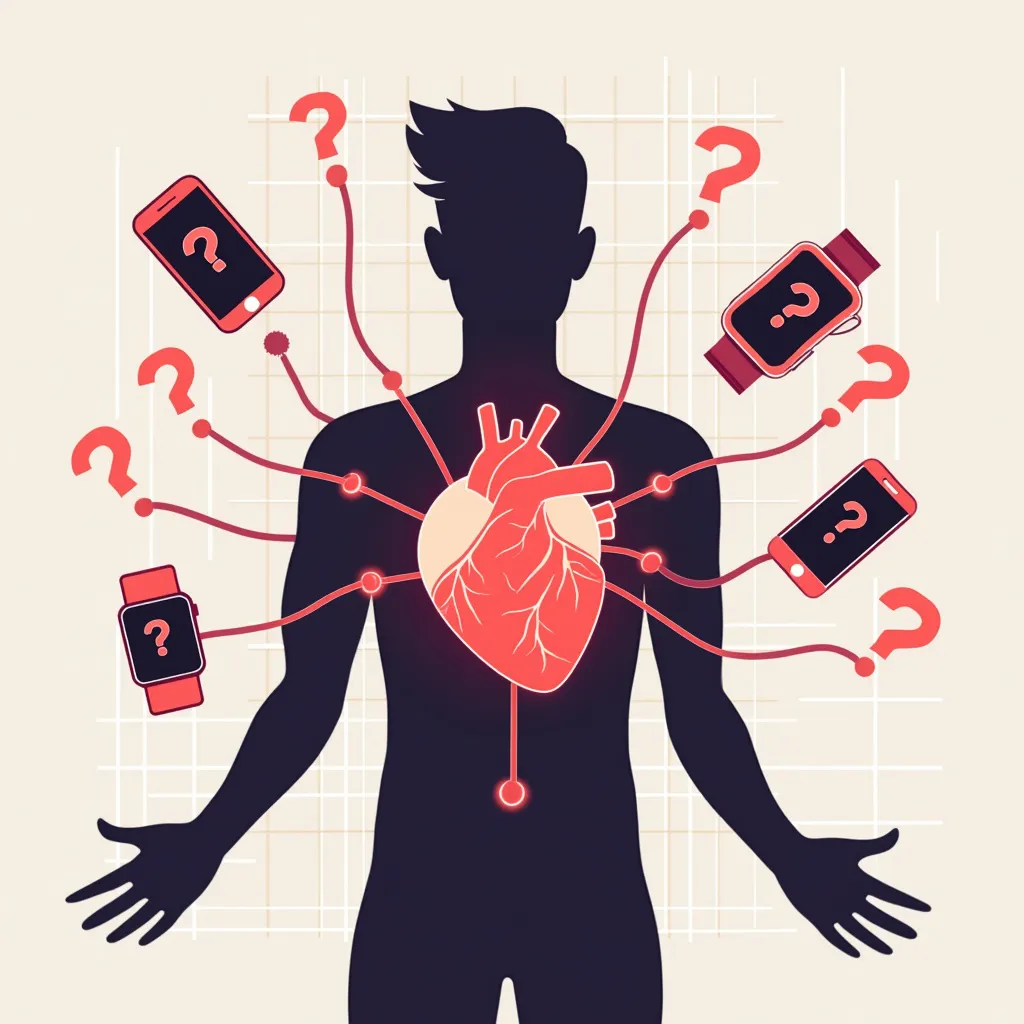The Revolution in Your Chest: How Smart Heart Health Technology is Changing Lives
Smart heart health technology is revolutionizing the way we monitor, prevent, and treat cardiac conditions. From wearable devices that track your heart rate 24/7 to AI-powered diagnostic tools, these innovations are not just improving care – they’re saving lives. Let’s explore how these cutting-edge technologies are transforming cardiac health management.

Did you know the watch on your wrist might be your heart’s new best friend? I’m amazed at how our everyday gadgets are turning into tiny heart doctors!
Here’s What I’ve Discovered:
- Smart watches and rings can now keep an eye on our hearts 24/7.
- Clever computer programs can spot heart problems years before they happen.
- Doctors can check on our hearts without us leaving home.
- Phone apps help us remember our heart medicine and stay healthy.
- Spending just 24 cents per person each year on these tech ideas could save over 2 million lives in 10 years!
Smart Heart Health Technology: Wearable Gadgets as Your Personal Cardiac Guardian
Imagine having a tiny heart doctor with you all the time. Sounds like magic, right? Well, it’s happening now!
I’m super excited about some cool gadgets that are changing the game for heart health. Let me tell you about them!
The Oura Ring: A Genius on Your Finger
The Oura Ring is like a super-smart mood ring, but for your heart! Soon, this little ring will be able to tell how “old” your heart is and how well it’s working. How cool is that?
It uses a special light trick to check how fast your blood moves through your body. This tells us how flexible your blood vessels are. Remember, flexible is good! The more bendy your blood vessels, the younger and healthier your heart.
But wait, there’s more! The ring will also test how fit you are. All you have to do is take a 6-minute walk, and it figures out how well your heart and lungs work together. It’s like a mini fitness test on your finger!
I read about this cool ring in The Verge. You can check it out here: The Verge Article on Oura Ring
Apple Watch: Your Wrist’s Health Hero
The new Apple Watch is getting even smarter. Soon, it will be able to tell if you have trouble breathing while you sleep. This is super important because breathing problems at night can lead to heart issues later on.
The watch uses its built-in motion sensor to check how you breathe while you’re snoozing. If it thinks you might have sleep apnea (that’s a fancy word for breathing problems during sleep), it’ll let you know. This way, you can talk to your doctor and fix the problem before it affects your heart.
I found out about this new Apple Watch feature from TechCrunch. Here’s where you can read more: TechCrunch Article on Apple Watch
Sennheiser Momentum Sport Earbuds: Your Workout Buddy
Now, let me tell you about something really cool – earbuds that can check your heart! The Sennheiser Momentum Sport earbuds have a special sensor that can measure your heart rate while you’re working out. They can even check your body temperature!
These earbuds connect to an app called Polar Flow. This app gives you all sorts of information about your workout and can even coach you. It’s like having a tiny personal trainer in your ears!
I learned about these amazing earbuds from The Verge. You can read more here: The Verge Review of Sennheiser Momentum Sport Earbuds
Dexcom G7: Keeping an Eye on Your Sugar
Here’s something else that’s pretty neat – a device called the Dexcom G7. It’s not for your heart directly, but it helps people with diabetes, which can affect your heart. This little gadget checks your blood sugar all day long.
The cool part? Now you can see your blood sugar levels right on your Apple Watch! You don’t even need your phone nearby. It’s like having a sugar detective on your wrist 24/7.
I read about this cool device in The Verge. Check it out here: The Verge Article on Dexcom G7
AI-Powered Smart Heart Health Technology: Predicting and Preventing Cardiac Issues

What if a computer could look into the future and see how healthy your heart will be? It’s not science fiction – it’s happening now!
I’m blown away by how smart computers are getting at predicting heart problems. Let me tell you about some amazing things I’ve learned about.
Seeing 30 Years into the Future
Scientists have made a computer program that can guess a woman’s chance of having heart problems up to 30 years in the future. That’s like predicting what will happen when I’m a grandparent!
This smart program looks at three things in your blood:
- LDL cholesterol (that’s the not-so-good kind)
- Something called Lipoprotein(a)
- And a thing that shows if there’s inflammation in your body
When all three of these are high, it means you’re three times more likely to have heart problems in the future. But here’s the good news: knowing this early means you can start taking care of your heart now!
I learned about this amazing prediction tool from the National Institutes of Health. You can read more here: NIH Article on Heart Disease Prediction
X-Ray Vision for Your Heart
Doctors at a big hospital called Cedars-Sinai have taught a computer to look at regular chest X-rays and spot signs of heart problems. It’s like giving the computer X-ray vision for hearts!
This computer is really good at its job. It can find heart issues that even doctors might miss. This means we can catch problems early and start fixing them right away.
I read about this X-ray analyzing computer on HIT Consultant. Check it out here: HIT Consultant Article on AI in Radiology
AI for Cancer Patients’ Hearts
Did you know that some cancer treatments can affect your heart? Scientists have created a smart computer program that can predict if a cancer patient might have heart problems after their treatment.
This program looks at things like your age, what kind of cancer you have, and what medications you’re taking. It then guesses if you might have heart issues later. This helps doctors take extra good care of cancer patients’ hearts.
I found out about this from HIT Consultant. You can read more about it here: HIT Consultant Article on AI Predicting Heart Issues in Cancer Patients
Telemedicine: Smart Heart Health Technology Bringing Cardiac Care to Your Home

Imagine getting top-notch heart care without leaving your living room. It’s not just possible – it’s happening right now!
I’m really excited about how easy it’s becoming to get heart care, even if you live far from a big hospital. It’s all thanks to something called telemedicine. Let me tell you how it works.
Your Phone: The New Doctor’s Office
There are companies working with big hospitals to create virtual heart care programs. One that caught my eye is a team-up between a company called Story Health and Saint Luke’s Mid America Heart Institute.
They’ve made a program for people with a heart problem called atrial fibrillation (AFib for short). Here’s how it works:
- You wear a smart watch or a Fitbit that keeps an eye on your heart all day.
- The information from your watch goes straight to your doctor’s computer.
- Your doctor can see how your heart is doing without you coming in for a visit.
- If there’s a problem, they can change your treatment right away.
- You can get advice and support through your phone or computer.
It’s like having a heart doctor in your pocket!
I found out about this cool program from Fierce Healthcare. You can read more about it here: Fierce Healthcare Article on Virtual AFib Care
Remote Heart Care: Helping People in the Countryside
Here’s something really cool – a company called Cadence is working with Lifepoint Health to help people with heart problems who live in the countryside. They’re using something called remote physiologic monitoring.
This means people can check their blood pressure and other important health stuff at home, and their doctor can see the results from far away. The cool part? People in rural areas who used this program actually did better than people in cities!
I read about this in Fierce Healthcare. You can learn more here: Fierce Healthcare Article on Remote Heart Care in Rural Areas
Mobile Smart Heart Health Technology: Your Smartphone as a Cardiac Health Coach
What if the same phone you use for TikTok could help keep your heart healthy? Well, it can!
I’ve discovered some amazing ways our phones are turning into health helpers. Let me share what I’ve learned.
Small Investments, Big Results
The World Health Organization (that’s a group of health experts who work all over the world) found out something amazing. If we spend just 24 cents per person each year on health apps and programs, we could save over 2 million lives in 10 years!
These health apps can do things like:
- Remind you to take your medicine
- Help you talk to a doctor from home
- Send you tips to stay healthy
- Answer your health questions
I learned about this from the World Health Organization. You can read their report here: WHO News on Digital Health
Your Phone: Your Fitness Buddy
A study found that when people use apps that remind them to move more, they actually do it! People who got daily reminders or rewards through an app walked over 1,500 more steps each day. That’s like walking an extra mile!
The best part? Many people kept walking more even 6 months after the study ended. And all that extra walking could:
- Lower the chance of dying early by 6%
- Cut the risk of dying from heart problems by 10%
That’s a big change from just using an app on your phone!
I found out about this study from the National Institutes of Health. You can read more here: NIH News on Exercise Incentives
Smart Heart Health Technology in Action: AI Detecting Cardiac Risks
What if a computer could spot heart problems just by looking at your regular check-up results? It’s not science fiction – it’s happening right now!
Scientists at the University of Leeds have created a super smart computer program called “Optimise”. This program can look at the health records that your doctor already has and figure out if you might be at risk for heart problems.
In a test with 82 people that Optimise thought might be at risk, they found some amazing things:
- One out of every five people had kidney problems that nobody knew about before.
- More than half of the people with high blood pressure got new medicines to help protect their hearts.
This is really exciting because it means we might be able to catch heart problems early, before they become really serious. It’s like having a super smart health detective working with your doctor!
I learned about this amazing AI program from an article in The Cumnock Chronicle. You can read more about it here: AI to help GPs pinpoint patients at risk of dying from heart problems
Digital Health Saving Lives
Here’s something really exciting I found out. The World Health Organization says that if we use more digital health tools, we could save 7 million lives and stop 5 million people from getting heart attacks and strokes!
These digital tools include things like:
- Apps that remind you to take your medicine
- Programs that help you quit smoking
- Devices that keep track of your blood pressure
It’s amazing how our phones and computers can help keep us healthy!
I learned about this from the World Health Organization. You can read more about it here: WHO News on Digital Health Impact
Wrapping It All Up
We’re living in an amazing time where the gadgets in our pockets and on our wrists can help keep our hearts healthy. How cool is that?
I’m really excited about all these new ways technology is helping us take care of our hearts. From rings that can tell how old our hearts are, to watches that watch us sleep, to phones that remind us to move more – it’s like having a whole team of heart doctors with us all the time.
But remember, even the coolest gadgets can’t replace the basics of heart health:
- Eating lots of fruits and veggies
- Moving our bodies every day
- Getting enough sleep
- Managing stress
These new technologies are here to help us do these things better and to catch any problems early. They’re like super-powered assistants in our journey to healthier hearts.
Cutting-Edge Smart Heart Health Technology: Latest Research Breakthroughs
Scientists are discovering amazing new things about our hearts every day. Let me share some of the coolest stuff I’ve learned!
Gut Bacteria and Heart Health
Did you know that tiny bugs in your tummy could help your heart? Scientists found that some gut bacteria, especially one called Oscillibacter, might help lower cholesterol and reduce the risk of heart disease. It’s like having tiny heart helpers right in your belly!
I read about this fascinating discovery in an NIH article. You can check it out here: NIH Article on Gut Bacteria and Heart Health
Anger and Heart Health
Here’s something that surprised me: feeling angry a lot might be bad for your heart. A study found that when people got angry, their blood vessels didn’t work as well. This could lead to heart problems over time. It’s a good reminder to try to stay calm and find healthy ways to deal with anger.
I learned about this from an NIH news release. You can read more about it here: NIH News on Anger and Heart Disease Risk
Exercise and Your Whole Body
We all know exercise is good for us, but scientists are finding out just how amazing it really is. A big study called MoTrPAC found that when we exercise, it doesn’t just help our muscles and heart. It actually changes stuff in our liver, brain, and even our fat cells! It’s like exercise gives our whole body a health boost.
I found out about this cool study from the NIH. You can learn more here: NIH Article on Exercise Effects on the Body
Conclusion: The Future of Heart Health is in Our Hands (and on Our Wrists!)
Wow, we’ve learned about so many cool ways technology is helping keep our hearts healthy! From smart rings to AI doctors, it feels like we’re living in the future, doesn’t it?
I’m super excited about all these gadgets and programs. They’re making it easier than ever to take care of our hearts. But you know what? The most important thing is still us – the choices we make every day.
These technologies are like super-powered helpers. They can remind us to move more, eat better, and check in with our doctors. They can spot problems early, before they get big. But they can’t make the healthy choices for us.
So, here’s what I think: Let’s use these cool tools to help us live healthier lives. Let’s let our watches remind us to stand up and stretch. Let’s use our phones to learn about heart-healthy foods. And let’s definitely use these new ways to talk to our doctors and get the care we need.
But let’s also remember the basics. Eat your veggies. Go for a walk. Get enough sleep. Laugh with your friends. And now we know, even taking care of the tiny bugs in our tummies can help our hearts!
The future of heart health is exciting, and it’s right here in our hands (and on our wrists!). Are you ready to be part of it? I sure am! Let’s use these amazing tools and work together for healthier hearts. After all, a healthy heart means more energy to enjoy all the awesome things life has to offer!
Frequently Asked Questions

1. Are these smart watches and rings as good as going to the doctor?
While these devices are super helpful, they’re not a replacement for your doctor. Think of them as helpers that give your doctor more information about your health. Always talk to your doctor about any health concerns you have.
2. Can a computer really predict heart problems 30 years ahead?
The computer program I mentioned is really good at guessing the chance of future heart problems, but it’s not a crystal ball. It looks at things in your blood that we know are linked to heart health. This helps doctors know if you might need extra care to keep your heart healthy as you get older.
3. Is it safe to talk to a doctor through my phone or computer?
Yes, it’s safe! Doctors use special secure systems to protect your privacy when you talk to them online. It’s a great way to get care, especially for check-ups or if you live far from a doctor’s office. But for emergencies, always call 911 or go to the hospital.
4. Do I need an expensive smart watch to keep my heart healthy?
Not at all! While smart watches can be helpful, the most important things for heart health are free: eating well, moving your body, getting enough sleep, and managing stress. Even a simple step counter on your phone can help you move more. The best gadget is the one you’ll actually use!
5. Can these technologies really save millions of lives?
The World Health Organization thinks they can! By helping people take better care of themselves and catching problems early, these technologies could prevent many deaths from heart disease and other health problems. But remember, they work best when we use them as part of a healthy lifestyle.





